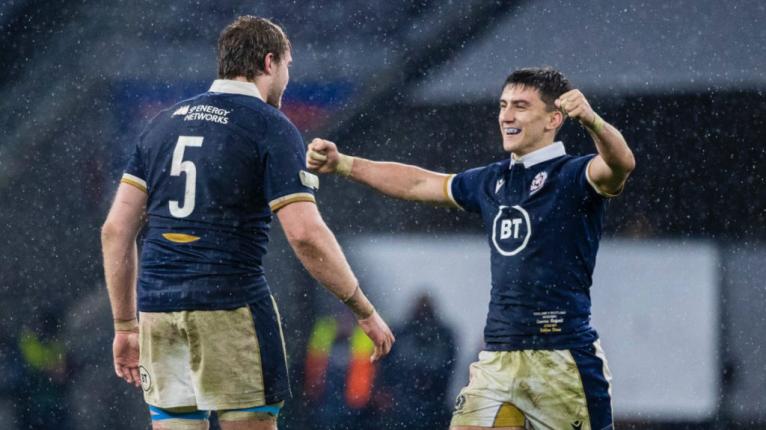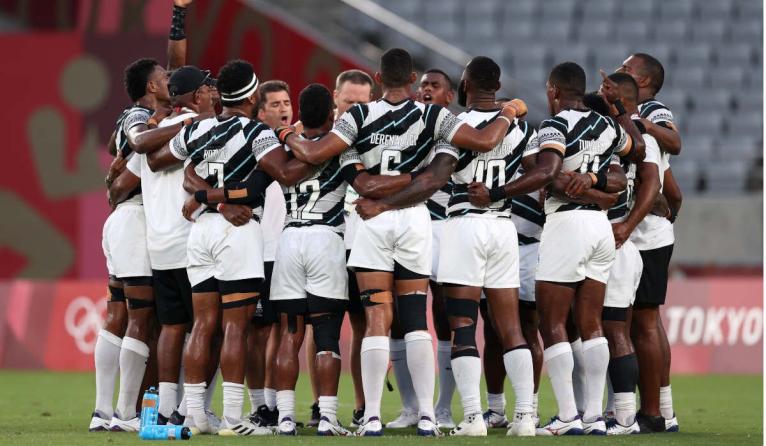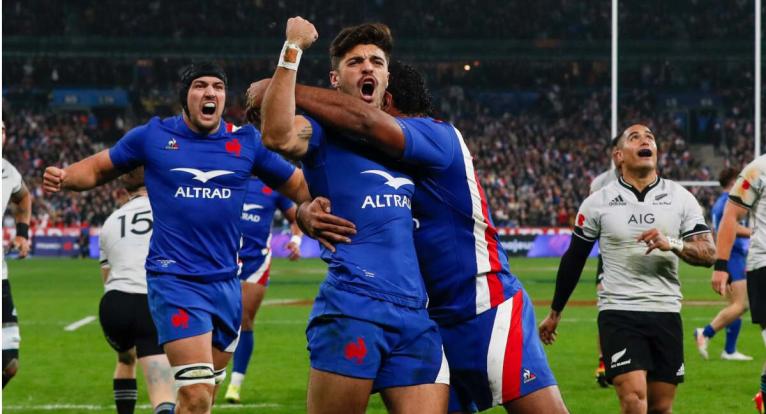When we look back at 2021, it will kickstart a plethora of emotions. Some will tell of regret for the empty stadiums and joyless Lions tour, while some memories will make our hearts will sing for the explosion of emerging superstars, rise of the underdog and Romain Ntamack’s derring-do from behind his posts in uniting the rugby world, as Les Bleus stunned the All Blacks. The XV have rounded-up a few unforgettable moments that stuck with them over the last 12 months…
Scotland conquer Twickenham
The ghosts of Twickenham long haunted – or perhaps taunted – Scottish rugby. Not since 1983 had the men’s national side prevailed in England’s stronghold. Not since the days of Laidlaw, Rutherford, Milne and Deans, a squad that would go on to win a precious Slam the following year, had Scotland conquered the famous old venue.
There had been brutal shellackings and desperate near misses along the way – enough to fill Loch Ness. So when Hamish Watson pilfered another English ball and shanked it off the pitch to end the game, it sparked one hell of a party.

Scotland were immense that day. They bested England up front, kept their heavy hitters quiet, and scored a fine try through the colossal Duhan van der Merwe. Cam Redpath, son to a former Scotland captain, who had seemed destined to represent England, excelled on debut. Watson was outstanding.
Though there were no supporters inside Twickenham, the sight of jubilant Scots capering on the paddock, holding aloft the Calcutta Cup, will long be cherished.
Curtains for Wales
Remember the curtains? Of course you do. The flowery, tasselled numbers in Wayne Pivac’s front room, scarcely concealed by a hastily erected Six Nations sponsors board.
Hopefully – pray, God, let it be so – we can do away with relentless Zoom interviews in 2022, but the sight of the newly crowned Six Nations champion coach conducting celebratory interviews with beige tassels hanging behind him was 2021 in microcosm.
Wales were a huge surprise package in this year’s championship. After an experimental autumn yielding some pretty wretched displays, come spring Pivac summoned his front-liners, and boy, did they deliver.
Only France denied them a famous Grand Slam, an utterly bonkers affair in Paris proving their undoing.
Harlequins crowned kings of England
A fairytale for the ages. Harlequins, meek and maddening for much of the season, stormed to the very summit of English rugby.
Their play was mesmeric; their posse of young coaches canny beyond their years. And the tale of their season pock-marked with brilliant little quirks.
Would Quins have scaled these heights had Paul Gustard not departed in January and left them DoR-less? Tyrone Green might scarcely have got a look-in if not for Mike Brown’s suspension. Ditto Jack Kenningham and his unfortunate pal, Will Evans, seriously injured when in outstanding form.
Look at what Green and Kenningham delivered in the latter throes of the campaign, never mind the semi-final and showpiece themselves. Joe Marler, the old warhorse, fetched up for the astonishing last-four showdown with Bristol in a helicopter. Scott Steele went from overweight and unattached to a Premiership champion.

Devastating tyros in Louis Lynagh and Marcus Smith dovetailed beautifully with the stalwarts, Marler and Danny Care. Smith was irresistible, proving his mettle to Eddie Jones. Alex Dombrandt, too, came of age as a barnstorming number eight with sublime footballing acumen.
And what about those big-time matches, oscillating, nerve-shredding contests for the ages. The insanity of Quins’ comeback to smite the Bears in extra time. The surgical brilliance in how they carved open Exeter Chiefs, the defending champions, at Twickenham.
We could name-check pretty much every member of the team, coaches and staff. This is a triumph that will be replayed, retold and relived for so many years to come.
Rassie goes viral
If Harlequins’ glory will endure, it is safe to say the summer’s British and Irish Lions tour is better off forgotten.
A pandemic tour could never conjure the magnificence nor capture imaginations as a great Lions voyage should. Deathly, fan-free stadia. The most tightly sealed of bubbles. No culture to be soaked up, no coaching clinics at local schools, no township visits, no immersion in South Africa and bonding with its people.
None of that could be helped, of course. At least not while rugby administrators were unable or unwilling to shift the whole feast back.
But the pallid backdrop was overshadowed by rancour off the field and dull, bludgeoning rugby on it. Rassie Erasmus and his infamous video critique – kind term – of Nic Berry took the game by storm. Erasmus seems a mischievous sort, and the game needs characters cast in the villain mould as much as it needs wholesome heroes, but the sideshow rumbling on for months became unedifying and petty.
It is time to move on.
Fiji win Olympic gold – again
The stadium announcer stopped talking. The DJ cut the blaring hype music. The bowl, hushed and eerily devoid of supporters, became a theatre. Fiji’s sevens brothers, who had just thundered to a second Olympic title in Tokyo, linked arms, reared their heads skywards, and began singing their most haunting and harmonious of hymns. t was a truly beautiful moment.
In the aftermath, Gareth Baber, their head coach, revealed the remarkable sacrifices made by his players and their families. For months, they were effectively locked up in a convent, bubbled away from their people and homes as the claws of coronavirus made landfall in Fiji.

Fiji had been whooped and roared relentlessly by the delegates who came to watch them. Only around a half a dozen, but furiously waving flags and bedecked in Bula shirts, they made enough noise to fill the empty cavern.
Some of them had never been on a plane before. Others still had never left the archipelago. And yet, they fetched up in Tokyo, dazzled and destroyed all comers, and retained their Olympic crown.
As the sport reeled from Rassie-gate, the bad blood and worse rugby in South Africa, trust Fiji to provide a wholesome splash of colour.
Red Roses lay waste
There can be no disputing the finest team in women’s rugby, not after the Red Roses put New Zealand, Canada and America to the sword in a blistering autumn programme.
England thrashed the Black Ferns on successive weekends with an aggregate scoreline of 99-27 across the two Tests. Thanks to Covid-19, New Zealand were not nearly so battle-hardened as their hosts, but the huge victories told the tale of England’s irrepressible rise.
RugbyPass contributor Will Owen explained their blistering ascent in a fabulous article during November. With the delayed World Cup – in New Zealand – taking place later this year, Simon Middleton’s side will be red-hot favourites.
An awesome autumn
Revenge for the World Cup final? Not quite, but certainly a monumental victory for England and their new brood as South Africa were pipped in a phenomenal autumn Test.
Eddie Jones later said his team “had to win the game three times”, the ebbs and flows captivating Twickenham, the siege laid by the South African bomb squad and the demonic Eben Etzebeth, the terrific breakaway try from young Raffi Quirke and Marcus Smith’s nerveless penalty to win it.
England – without Owen Farrell, without Anthony Watson, the Vuinpola brothers, Jamie George or Luke Cowan-Dickie – would not be battered into submission. They would not succumb to South African power.
In smiting the Springboks, England capped a brilliant autumn. Smith and Quirke look to the manor born, but so too the immense Freddie Steward, Jamie Blamire, Nic Dolly and Bevan Rodd have greatly enhanced Eddie Jones’ options. England are building again.
The All Blacks crack
It was a classic, no doubt, but England’s triumph was not the pick of the autumn fixtures. That title, indisputably, belongs to France v New Zealand, a transfixing heavyweight showdown in white-hot Parisian tumult.
It felt like a deeply seminal win for France, in how their brutality and elan combined to lacerate the All Blacks. It was their first victory over New Zealand for a dozen years and how they gave them a kicking, with rugby’s greatest talent, Antoine Dupont, their gunslinger-in-chief.
In his tremendous analysis piece, former Scotland number eight and Top 14 veteran Johnnie Beattie describes how Fabien Galthie plotted the historic performance.
The touring juggernauts were at the end of a long and exhausting year, but their autumn results show how fine the margins are between the north and south, between any of the game’s top sides on any given day.

Wales pushed South Africa close and beat Australia, who had already sank the Springboks twice in the Rugby Championship. Scotland put the Wallabies away but were grimly overpowered by South Africa.
England beat both Australia and South Africa, but lost to Scotland, Wales and Ireland in the Six Nations. France were pipped by England and Scotland in the championship, but bullied New Zealand to win by 15 points in Paris. Ireland lost to Wales, but they too devoured the All Blacks in a rousing Dublin showdown.
Ireland have beaten New Zealand three times in five years. South Africa and Australia and now France have managed it in the past two.
The All Blacks have long been the standard bearers for our game. Where they lead, the rest of the rugby world tends to follow. Only no longer trailing in their slipstream. What will New Zealand do next? The upshot could be exhilarating.


Comments
Join free and tell us what you really think!
Sign up for free